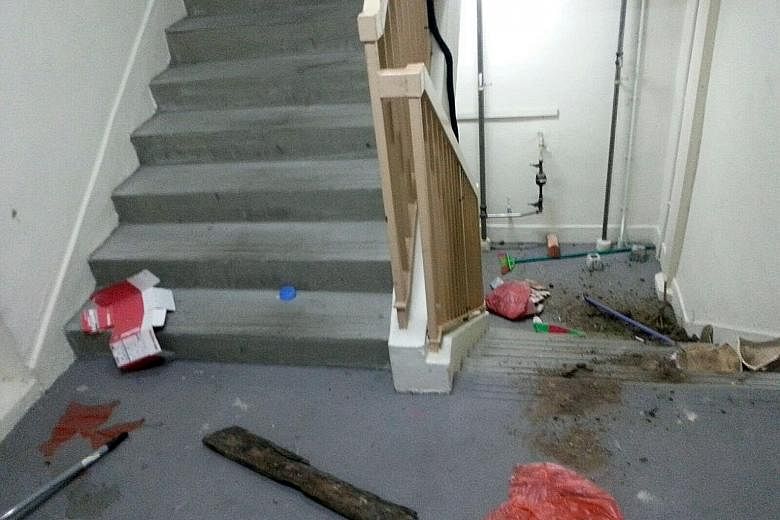Every day, Mr Neo Teong Heng, 44, lives in fear, not knowing when he would next hear shouting and banging on his front door, or find waste strewn at his doorstep.
In May last year, the perpetrator, a woman in her 40s, turned up with an iron rod in her hand.
Worried for the safety of his 84-year-old mother, Mr Neo made a police report, leading to the woman's arrest under the Mental Health Act.
He has made six police reports over the past two years, but the incidents continued.
Mr Neo's frustration is shared by the woman's hapless husband, who said that he wants to admit her into mental institutions or nursing homes but cannot do so for various reasons.
The husband, who wants to be known only as Mr Foo, revealed that his wife suffers from schizophrenia that has worsened with age.
The 66-year-old beverages specialist said his wife used to live in Toa Payoh Lorong 8, where Mr Neo lives, and when she sees Mr Neo's mother, "she would 'recall' how the older woman 'mistreated' her in the past". Mr Foo and his wife now live in Lorong 1.
-
HELPLINES
-
Singapore Association for Mental Health: 1800-283-7019
Institute of Mental Health's Mental Health Helpline: 6389-2222
Samaritans of Singapore: 1800-221-4444
Care Corner Counselling Centre (Mandarin): 1800-353-5800
Silver Ribbon: 6386-1928
Tinkle Friend: 1800-274-4788
"She can't stay in a confined place, and that's why I let her go out. She needs to occupy her mind," added Mr Foo. "But when she has a relapse, she doesn't recognise her surroundings."
Mrs Foo has been admitted to the Institute of Mental Health (IMH) on at least three occasions, for a week to 10 days each time. She has since been discharged and now visits a psychiatrist every month, Mr Foo said.
While he wants to put his wife in a nursing home, Mr Foo said the waiting time is long. Admitting her to a home, he added, may cost up to $1,700 a month, leaving him with around $600 for daily expenses.
NOT ISOLATED
Experts say that although there are sufficient safeguards to support these individuals in living in the community, cases like Mrs Foo's where mental health patients could pose some degree of safety risks to others may not be isolated.
They add that more can be done to prevent repeated, minor offences from escalating into violence if the situation is aggravated.
In Mrs Foo's case, she was arrested only once under the Mental Health Act, in her interactions with Mr Neo's family. The Straits Times understands that after the arrest, she was referred to IMH for an assessment, and was discharged later on the basis that her condition was not serious enough and she could continue to live at home.
Mr Neo is puzzled why this was allowed despite subsequent cases of "harassment" by Mrs Foo.
Criminal lawyer Shashi Nathan said non-arrestable offences could lead to an arrest and charge if an offender commits the acts repeatedly, or poses a danger to society.
He said the police and courts take a "considered approach" for offenders with mental health issues. This includes the option of community-based sentences, which could involve a mandatory treatment order.
While there are no figures on arrests under the Mental Health Act, volunteers were activated 228 times last year for police interviews with people who have intellectual disabilities or mental health issues.
Arrests under the act are usually referred to IMH with no further police action, said the police.
In such cases, the person is reviewed in IMH's emergency service, said IMH senior consultant Jerome Goh. A doctor then decides whether admission should be voluntary or mandated - after checking if there is a risk of harm to the offender or others around him.
The doctor also assesses if the offender's issues can be addressed in emergency service instead, with follow-ups in outpatient clinics and via community support, he added.
CHALLENGES EXIST
Psychiatrist Lim Boon Leng said that despite existing safeguards, it may be difficult to have law enforcement take patients with mental illnesses to hospitals for treatment or admission, if a crime was not committed.
Of Mrs Foo's behaviour, he said: "Neighbours should keep calm and seek the help of her family members. If there are acts of dangerousness, calling the authorities may be necessary as a last resort."
Mr Foo said he cannot afford to send his wife to institutions because his income puts him out of the eligibility criteria for ComCare, an aid scheme for those with low income.
Such aid may come in the form of cash assistance or support for healthcare. While long-term help is available, it is targeted at the most needy who cannot work because of age, illness or disability, and have limited or no income.
Mrs Foo was referred to the Singapore Anglican Community Services in February this year, for a volunteer to befriend her while a family service centre continues to explore options for her long-term care.
POSSIBLE SOLUTIONS
Experts said other solutions could be considered to avoid more situations like Mr Neo's.
Dr Lim said Singapore could consider having a version of community treatment orders for certain cases, where a court can mandate that a patient be treated even if he has not been charged with an offence.
But he added: "People with mental health issues may be seen as disruptive, but they are rarely violent unless the situation is escalated, such as when people confront them or appear aggressive."


